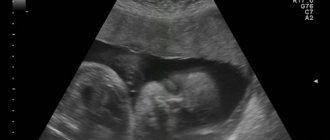Embryogenesis of the hearing organs
The process of developing hearing organs in a baby is one of the most difficult. At 4-5 weeks of pregnancy (when the mother just begins to miss her period), the embryo develops a rudiment that will later become the inner ear. At 7-8 weeks of pregnancy, the structures of the middle ear begin to form. The outer ear is finally formed in the third trimester, and hardening of the cartilage tissue of the ears occurs shortly before childbirth.
Until the fifth month of pregnancy, a very important process of formation and formation of the structures of the inner ear lasts. The labyrinth finally becomes hard by the 18th week of pregnancy. The auditory ossicles begin to harden at approximately 3 months of pregnancy and this process is completed closer to childbirth.
The outer ear is imperfect even at birth. The ear canal remains soft, and its final formation is completed only during the first year of the baby’s life.
Since the process of embryogenesis of hearing in a child has not yet been fully studied and is very multi-stage, at any stage an unforeseen situation may arise that can lead to the birth of a baby with impaired hearing functions.
When does the baby start to hear?
The hearing organs of the embryo begin to form in the fifth week from the moment of conception, or in the seventh obstetric week. First, the embryo develops an inner ear, and then the middle and outer ears. If you perform an ultrasound in the eighth week of pregnancy, you can see the outlines of the baby’s small ears. But during this period, when the hearing organs are just being formed, the child cannot yet hear.
But at the sixteenth week of intrauterine development, the fetus begins to perceive the first sounds. At the first stage, he feels them as vibrations of varying intensity, but already at the twenty-first week the child distinguishes sound waves and hears them the way you and I do. Moreover, it picks up not only the noises heard inside the mother’s body, but also voices, hum, music from the outside world. The world of sounds is gradually expanding, but so far the baby hears them somewhat muffled.
Ability to hear
The baby acquires the ability to hear in the womb at the 15th week of pregnancy. It is at this moment that the main stages of the formation of the inner ear are completed and the processes of formation of the middle ear are already underway. At first, a baby’s perception of sounds is not the same as yours and mine. He hears them, but the cerebral cortex has not yet matured and is not able to analyze the signals. The hearing of the fetus at 15-16 weeks of pregnancy is more reminiscent of the auditory perception of the world by reptiles. With his inner ear he only picks up the vibration created by sound waves .
The beating of a mother’s heart is one vibration, the loud sound from the fall of a heavy object next to her or the ringing of an alarm clock is a completely different vibration.
The mother's voice already has a special meaning for the baby, since its vibrations are different from the voices of other people.
Almost like us, the baby begins to hear only at 26-27 weeks of pregnancy. This means that at this stage the fetus no longer just hears, but reacts to sound. He gradually learns not just to hear something, but also to analyze what he hears. The newborn turns his head towards the sound source. He learned this in the womb.
During the last three months of intrauterine development, the baby listens to sounds with pleasure. Hearing for him in the third trimester is another way of understanding the world around him.
What do you hear?
The baby can't hear everything. It is naive to believe that in his mother’s womb he is in silence and grace, enjoying the voice of his mother who reads fairy tales to him. In the womb, the noise level is almost like in a small factory, and in it the baby simply physically cannot perceive all the sounds from the outside. He constantly hears the noise of blood flow in the vessels, the mother’s breathing, the peristalsis of her intestines, and the beating of her heart.
If mom speaks, he hears her voice well. At later stages of pregnancy, the fetus already feels the mood of its mother by the timbre and strength of her voice. If the expectant mother screams, the baby begins to worry. The child reacts to sharp sounds by increasing motor activity. This is how the work of the auditory nerve manifests itself as the hearing center forms in the cerebral cortex.
This is very easy to check. It is enough to turn on music in the headphones and place them on the pregnant woman’s belly. The baby will begin to move more actively or, conversely, change his behavior and become quiet. Scientists have found that in a child at 30 weeks of pregnancy, certain areas of the cerebral cortex begin to activate - mainly the temporal and frontal lobes. It is these centers that are responsible for recognizing spoken speech, for logic and thinking, and for the ability to learn.
Mothers often ask at what stage of pregnancy they can start reading books to their child and communicating with him. The answer is quite simple - on any one. But the greatest benefit for the development of the baby will come from the lullabies of the mother and her fairy tales in combination with gentle stroking of the belly with a hand after 25-26 weeks of pregnancy. It is at this time that the fetus will begin to analyze the sound and its source. He will have favorite music compositions, as well as sounds that he does not like.
For example, most pregnant women note that babies after 28 weeks of pregnancy react rather nervously to the slamming of a door, to the barking of a dog, or to the ringing of a mechanical alarm clock.
The child should definitely be allowed to listen to music. He cannot hear her through headphones if they are on his mother's ears. Only the woman perceives music at this moment. The child feels her emotions and nothing more.
If you turn on the music through the speakers, both mother and child will enjoy listening.
Remember that all sounds from the outside sound a little muffled to the baby, because the abdominal wall of the mother and the amniotic fluid in which the baby is in the way are in the way. But in general, he does a good job of capturing what's happening on the other side of his stomach.
That is why you should not quarrel and shout or swear. It is better to introduce the baby to classical music, gentle children's lullabies, then he will recognize these melodies even after birth. It has been proven that newborns and infants fall asleep much better to music that is already familiar to them from the time they were in the womb. After birth, babies immediately recognize familiar voices - mother's, father's.
It is also necessary to read and sing to the baby in the womb so that those areas of the brain that will then be responsible for its development, intelligence, learning and speech begin to be stimulated as early as possible.
To learn about when a baby begins to hear in the womb, watch the following video.
medical reviewer, psychosomatics specialist, mother of 4 children
Good day to you, friends! Not so long ago we figured out whether a child can see immediately after birth. Today I decided to write a similar article only in the field of hearing. After all, young mothers are also interested in whether their newborn baby can hear them, why she reacts so poorly to sounds, etc.
Why is it necessary to communicate with your child during pregnancy?
- From about 8-10 weeks, the baby’s senses are actively developing, and he is able to respond to your touch, warmth, pain, vibration.
- By 18-20 weeks, he is already showing character traits, and facial expressions are capable of conveying emotions. Brain activity develops quite actively, the baby hears and perceives what is happening in the outside world.
- By week 24, the vestibular apparatus is quite well developed and the baby is able to control his movements, take a comfortable position, express dissatisfaction and experience positive emotions.
There is no doubt left!
As the baby develops, he feels everything and waits for your communication with him! With regular communication with the child throughout pregnancy (which was as comfortable as possible for the mother, without stress and anxiety), emotionally healthy, calm, balanced children are born. Sometimes children themselves can ask for attention from their parents, wanting to be talked to and caressed, and at the same time they become more active and mobile. Studies confirm that children with whom their parents spoke while still in the womb, after birth, react more actively to the voices of their parents, cry less, calm down faster, and begin to develop earlier.
Can a baby hear in the womb?
It is quite common to find parents talking to their unborn children. You've probably seen not only in real life, but also on TV, how dad stood in front of mom's round belly and said something to his baby in a calm, monotonous voice.
At first glance, this may seem like just a cute procedure, but nothing more. You may think that in the womb there is only a developing fetus that does not see or hear anything, but this is not so. The hearing function begins to actively develop from the twentieth week after conception. In this regard, all these conversations with the fetus are not so useless. He hears you.
Naturally, very sharp and loud sounds will drown out the amniotic fluid, but it is still better not to listen to “hard rock” or scream at the top of your lungs during late pregnancy.
All this has been proven through experiments. The newborn baby responded very well to the sounds that came to him while he was still in the womb.
How to communicate with your baby?
To establish contact with the baby in the mother’s tummy, watch his activity, remembering at what time of day he is more active. At such moments, talk to your baby, tell him about what you like, about what beautiful things await him in this World. Mom can tell what the baby’s dad is like and how he loves and cares for him, and dad can tell about mom, because the child hears the voices of his parents in different ways (mom’s vibrations from the inside, and dad’s vibrations from the outside). Conversations with the baby in the womb should be very gentle and sincere.
Choose to address your little one so that he knows and gets used to the fact that this is how you talk to him. It is recommended to communicate with your baby for at least 15 minutes daily. Over time, you will notice that he responds to you and pushes exactly in the place where you hold your hand.
A child in the womb, constantly hearing his mother’s voice, will know that she is nearby, that she remembers him and is always ready to tell him something kind and tender. Such communication allows you to establish an emotional connection with the child even during pregnancy and contributes to better contact between parents (especially mothers) and the baby after his birth.
Show your child that he is long-awaited and dearly loved by both parents, because the baby feels and hears everything while still in his mother’s tummy! And remember, it’s never too late to start communicating with your child!
Perinatal psychologist Oksana Sergeevna Brezhneva receives consultations in two branches of the Territory of Health - on Oktyabrsky Pole and on Tula.
What and at how many months does a baby hear after birth?
That's it, we've dealt with children in the womb, let's now look at how things are with the hearing of a baby who has already been born.
From some sources you can find out that the baby does not hear anything in the first days, and the reason for this is the amniotic fluid, which still does not leave the baby’s ears) Others write that the baby hears perfectly immediately after birth, but only reacts poorly to sounds.
I will tell you about my child. Right after birth, it really looked like he couldn't hear anything. You could turn on the TV loudly and talk. This did not mean that there was something wrong with the child, because now, six months later, he reacts perfectly to any sound, you need to walk quietly past him, so as not to wake him up, God forbid. I generally keep quiet about TV and music. If we want the child to sleep well, then we need to listen only to monotonous music, and quietly, and also choose movies “wisely” so that there are fewer explosions and special effects. The hearing function returned to normal gradually, we just didn’t attach much importance to it.
So the first month of a baby’s life is not an indicator , and then everything depends on the child himself. Already in the first week of your child’s life, you will begin to notice that he reacts to loud sounds and protect him from them, and after one month you will completely stop talking loudly when the child is sleeping. Although, if the baby is exhausted and has played enough, then it happens that “you can’t wake him up with a gun.”
In principle, the child is “scared” of loud sounds only in the first months , and starting from the third month he may simply wake up and that’s it (which is also not good, disturbing the child’s sleep).
The reaction to sounds in the first months of life manifests itself in the form of shudders. As the child gets older, he will simply turn his head in the direction where the sound is coming from. In some cases, the head will turn sharply.
At what point does the embryo begin to feel at least something and what do sperm and eggs feel?
Often, all manipulations carried out with germ cells and embryos in the embryology laboratory remain something unclear and unattainable for the patient. And yet the question “How are my embryos doing there?” undoubtedly worries every patient.
Talking with patients from time to time, we came across similar questions from them: “Do sperm and eggs outside the body feel something?”, “When can an embryo feel something?”, “At what point does an embryo begin to feel something?” at least something that sperm and eggs sense?”
So, in fact, both sperm and eggs do not feel anything in the usual sense of the word, because they do not have a nervous system. For now, these are just germ cells that carry genetic material and have special properties necessary for their meeting and fusion. Figuratively speaking, if you prick a sperm with a needle, it won’t hurt, that’s for sure.
But eight weeks after the egg has selected the sperm it loves and their fusion has occurred, the embryo is ready to experience its first feeling. And his very first feeling will be irritation. At eight weeks, this is what happens: the fetus begins to respond. And the first thing he can react to is small flakes of skin or small hairs that have come off of him, but remain floating with him in the amniotic fluid. And when such a scale gets on the cheek of the embryo, it becomes irritated and begins to move its body back and forth to throw off the scale, and may even try to remove it with its hand. By this age, the hands have long been formed and even the fingers are perfectly defined.
By week 16, the embryo has already completed the construction of its taste perception system. That is, in theory, if you put a sugar crystal on your tongue at 16 weeks, it would taste sweet. But this can only be discussed theoretically. That's why. At this age, the embryo still receives all its nutrients through the umbilical cord. And only the substances themselves reach through the umbilical cord, without taste. That is, if the mother eats a chocolate bar, the embryo will not feel the taste of the chocolate bar, only glucose will reach it. So, in theory, we know that a child at this age has a taste perception system similar to that of an adult, but we cannot verify it in practice.
At the same age, at 16 weeks, the development of olfactory receptors is completed. That is, the embryo is already able to distinguish several hundred odors. But as with taste perception, this is all theoretical, because there is no smell inside the mother, and odors do not reach through the umbilical cord.
At 16 weeks, the baby can already smile and is now ready to experience joy. By this age, the umbilical cord is ready to transport the embryo not only protein, but also endorphins, hormones of joy. If a mother sits in the sun on a park bench on a warm spring day and enjoys it, the child will also be very happy.
But already at 18 weeks the fetus begins to hear. That is, you can play classical music for him even from the first week of pregnancy, but he will hear it only by the 18th week. Now he is starting to react strongly to loud noises. If you suddenly turn on loud music or if someone knocks on the door too loudly, the child freezes and gets scared. In addition, he can hear his mother's heartbeat well. When a woman gets scared, her fetus senses it all well and gets scared too.
And finally, at 20 weeks the baby can already feel tactile influence. Before this, he does not really understand what is happening in this case, because the embryo is very small in size, and there is a lot of amniotic fluid and they protect it from everything that happens outside. But as the fruit grows and takes up more and more space, there is less water, and the protective layer becomes thinner. This means that now the child can feel, for example, how his mother strokes him. Of course, this is still not a full stroking, as in the case of skin-to-skin contact. This feeling is most likely similar to being stroked on the back through a very fluffy fur coat, but nevertheless it is still very pleasant for him.
Thus, from birth, a child has excellent tools to “receive” information from the outside world. And from the first days of life, these instruments are actively working, and with age they are finally formed and begin to work in full force.
How to check if a newborn can hear
First of all, decide whether you need to check at all, or you yourself will notice how the child reacts to the next knock on the door or the loud voice of the parents. If you can’t bear to wait at all, then take the loudest rattle and rattle it one at a time near the newborn’s ears. If there is no rattle, then you can simply try clicking your fingers near your ear.
By the way, hearing testing right in the maternity hospital takes place in the modern world, so you can ask to do it there too. If you have already been discharged from the maternity hospital, no one forbids you to contact the pediatrician at the children's hospital with a request to have your hearing checked.
In principle, that’s all, we have sorted out the issue and found out when newborn babies begin to hear.











